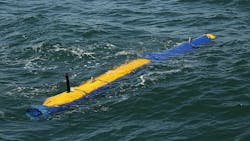Navy asks Metron to develop advanced modular payloads for unmanned undersea vehicles (UUVs)
ARLINGTON, Va. –Machine autonomy experts at Metron Inc. in Reston, Va., are developing advanced modular payloads for unmanned undersea vehicles (UUVs) under terms of an $8 million contract announced Tuesday.
Officials of the U.S. Office of Naval Research (ONR) in Arlington, Va., are asking Metron UUV experts to undertake this research as part of a 2017 long-range broad agency announcement for Navy and Marine Corps science and technology research. This contract to Metron has options that could increase its value to $21.1 million.
The ONR solicitation that pertains to this contract to Metron encompasses technology research in expeditionary maneuver warfare and combating terrorism; command, control, communications, computers, intelligence, surveillance, and reconnaissance (C4ISR); ocean battlespace sensing; sea warfare and weapons; warfighter performance; naval air warfare and weapons.
Metron has years of experience in machine autonomy to enable long-endurance UUVs to operate autonomously in many different kinds of challenging ocean environments.
In late 2015 ONR awarded a $29.8 million contract to Metron to develop machine intelligence for future generations of U.S. Navy UUVs for a wide variety of applications like long-range surveillance.
Related: Navy asks Metron for autonomy and control software for future large-displacement UUV
In this project Metron produced software for advanced UUV autonomy that runs on government-provided hardware to demonstrate emerging machine autonomy capabilities in several different kinds of military missions.
The company also is involved in developing autonomy software for the ONR Large Displacement Unmanned Undersea Vehicle (LDUUV) project, which includes autonomy for the LDUUV involves autonomy software, computer hardware, and sensors.
In 2013 Metron won a $7.3 million ONR contract for in-lab integration and testing of autonomy and mission planning software with bench test hardware selected for deployment on the LDUUV.
Metron developed autonomy software to enable the future LDUUV to avoid all vessels in its area of operations, including fishing boats. Company experts tackled autonomy challenges such as detecting and avoiding undersea stationary and moving obstacles, as well as path planning algorithms to minimize energy consumption while avoiding obstacles.
Metron has dealt with other challenges such as detecting, locating, and identifying surface vessels; determining the intent of detected surface vessels; and detecting and avoiding all kinds of fishing nets and fishing gear, including mono-filament and twine nets which are difficult to detect.
In addition to Metron, other companies that worked on autonomy and control for the future LDUUV included Hydroid Inc. in Pocasset, Mass. -- a subsidiary of Kongsberg Maritime AS in Kongsberg, Norway.
ONR's LDUUV project aimed at developing a large unmanned submarine able to operate in the open ocean and in coastal waters and harbors on missions lasting more than 70 days to gather intelligence, surveillance, and reconnaissance (ISR) information. Major technology thrusts of the program sought to develop UUV autonomy, as well as long-endurance propulsion systems for large UUVs.
On this contract Metron will do the work in Reston, Va., and should be finished by the end of 2019. For more information contact Metron www.metsci.com, or the Office of Naval Research at www.onr.navy.mil.
Ready to make a purchase? Search the Military & Aerospace Electronics Buyer's Guide for companies, new products, press releases, and videos

